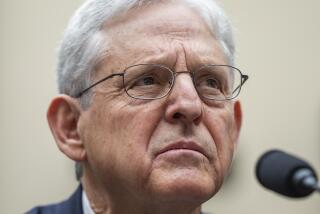North Is Urged to Testify to Protect Image
- Share via
WASHINGTON — Members of Congress on Thursday challenged Lt. Col. Oliver L. North, key figure in the Iran- contra scandal, to cooperate with the congressional investigating committees if he hopes to retain his image as “the pillar of patriotism.”
Committee members rejected North’s reasons for refusing to be questioned privately by the committee staff before his scheduled public testimony in mid-July. Instead, they proposed a compromise under which North would be questioned in a closed “executive” session of the committees before the public session.
The differences between a private interview and an executive session are mostly technical, but the proposal was designed to satisfy North’s legal objections. Brendan Sullivan, North’s lawyer, has argued that the statute giving limited immunity to North does not apply to a private deposition and thus such testimony could be used against him in criminal proceedings.
Committee attorneys Arthur L. Liman and John W. Nields Jr. were scheduled to meet with Sullivan Thursday night to discuss the matter, but no settlement was expected until next week, if at all.
Fearing that North may intend never to testify before Congress, committee members also sought to publicly shame the former White House aide into cooperating by arguing that the country would expect no less than complete testimony from a man who has been called “an American hero” by President Reagan.
If North refuses to testify, Rep. Dick Cheney (R-Wyo.) said, he “would move in the eyes of many of us from the posture of having been a man trying to serve his country and his President . . . to a figure with serious legal problems and obviously not the pillar of patriotism that he would like to have portrayed.”
‘Paradigm of Arrogance’
Likewise, Senate Majority Leader Robert C. Byrd (D-W.Va.) said the position taken by North turns this “once-called hero” into a “paradigm of arrogance.”
North, 43, a Marine lieutenant colonel, was described as a hero by Reagan shortly after the President fired him last Nov. 25 for his alleged role in diverting profits from U.S. arms sales to Iran to the Nicaraguan resistance.
Cheney said Congress wants to avoid a drawn-out legal battle that would delay the continuation of the Iran-contra hearings but that the committees will be forced to cite North with contempt of Congress if he refuses to testify.
Sen. William S. Cohen (R-Me.) said many committee members suspect that North actually wants to be held in contempt of Congress--betting that, during the appeals process, he would be indicted by independent counsel Lawrence E. Walsh, a step that would save him the embarrassment of publicly testifying before the committees.
“He’s trying to play off the Congress against the independent counsel,” Cohen said.
A Tougher Decision
The committees’ decision to insist on private testimony from North was surprisingly tougher than expected. On Wednesday, Sen. Daniel K. Inouye (D-Hawaii), chairman of the Senate investigating panel, indicated the committees might be willing to accept only public testimony by North.
But Rep. Lee H. Hamilton (D-Ind.), chairman of the House committee, indicated the members of his panel could not accept that because “then Col. North would be dictating the procedures.”
Questioning witnesses privately before their public testimony, a common practice for congressional investigating committees, allows the investigators to verify the information before public sessions. Virtually all of the witnesses who have testified so far at the Iran-contra hearings have been questioned privately first.
In the case of North, Hamilton said: “We think private testimony is very, very important.”
One of Last Witnesses
North is not expected to be called publicly before the committees until July 17, making him one of the last--if not the final--witness to appear before the Iran-contra congressional investigation. His private deposition had been scheduled to begin Thursday.
Meanwhile, the committees announced that public hearings will resume next Tuesday with the testimony of Glenn Robinette, a security consultant who was employed by retired Air Force Maj. Gen. Richard V. Secord, the Iran-contra middleman.
The committee also released a copy of the private testimony of retired Air Force Lt. Col. Richard B. Gadd, who was employed by Secord in a secret air-supply operation to aid the contras. As others have done, he contradicted Secord’s claim that he had no interest in profiting from the venture.
Lineup of Witnesses
Robinette will be followed to the witness table by a three-member panel of former Defense Department officials: Noel Koch, former principal deputy assistant secretary for international security affairs; Henry Gaffney, director of plans for the Defense Security Assistance Agency, and Army Lt. Gen. Colin Powell, deputy national security adviser and former military assistant to the secretary of defense.
The next witnesses will be U.S. District Judge Stanley Sporkin, former CIA general counsel; Assistant Atty. Gen. Charles J. Cooper, and Michael A. Ledeen, former consultant to the National Security Council on Middle East matters.
Meanwhile, Rear Adm. John M. Poindexter, former national security adviser, returned to Capitol Hill Thursday for a third day of private testimony. He is scheduled for a public appearance next month.
More to Read
Get the L.A. Times Politics newsletter
Deeply reported insights into legislation, politics and policy from Sacramento, Washington and beyond. In your inbox twice per week.
You may occasionally receive promotional content from the Los Angeles Times.










